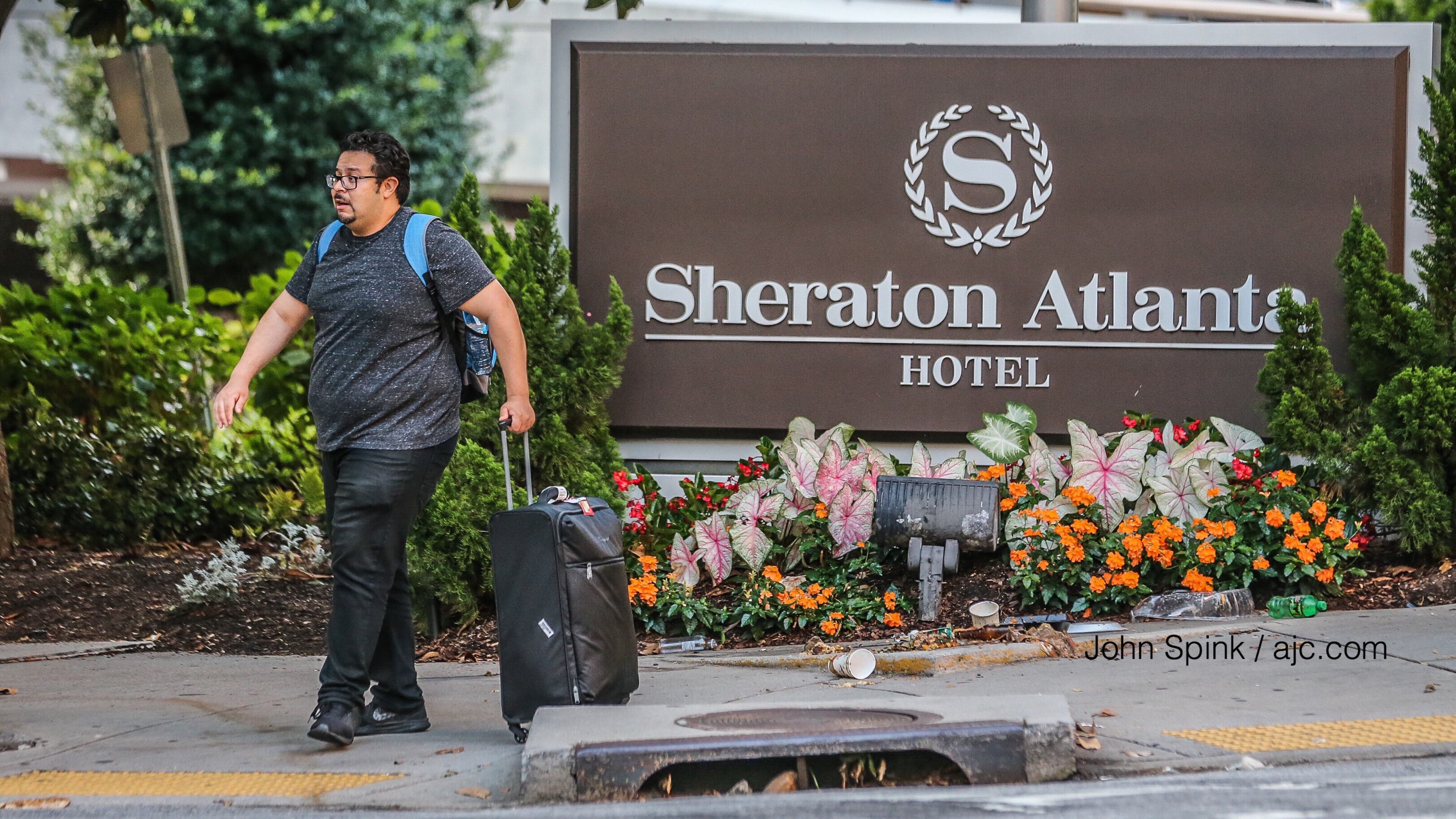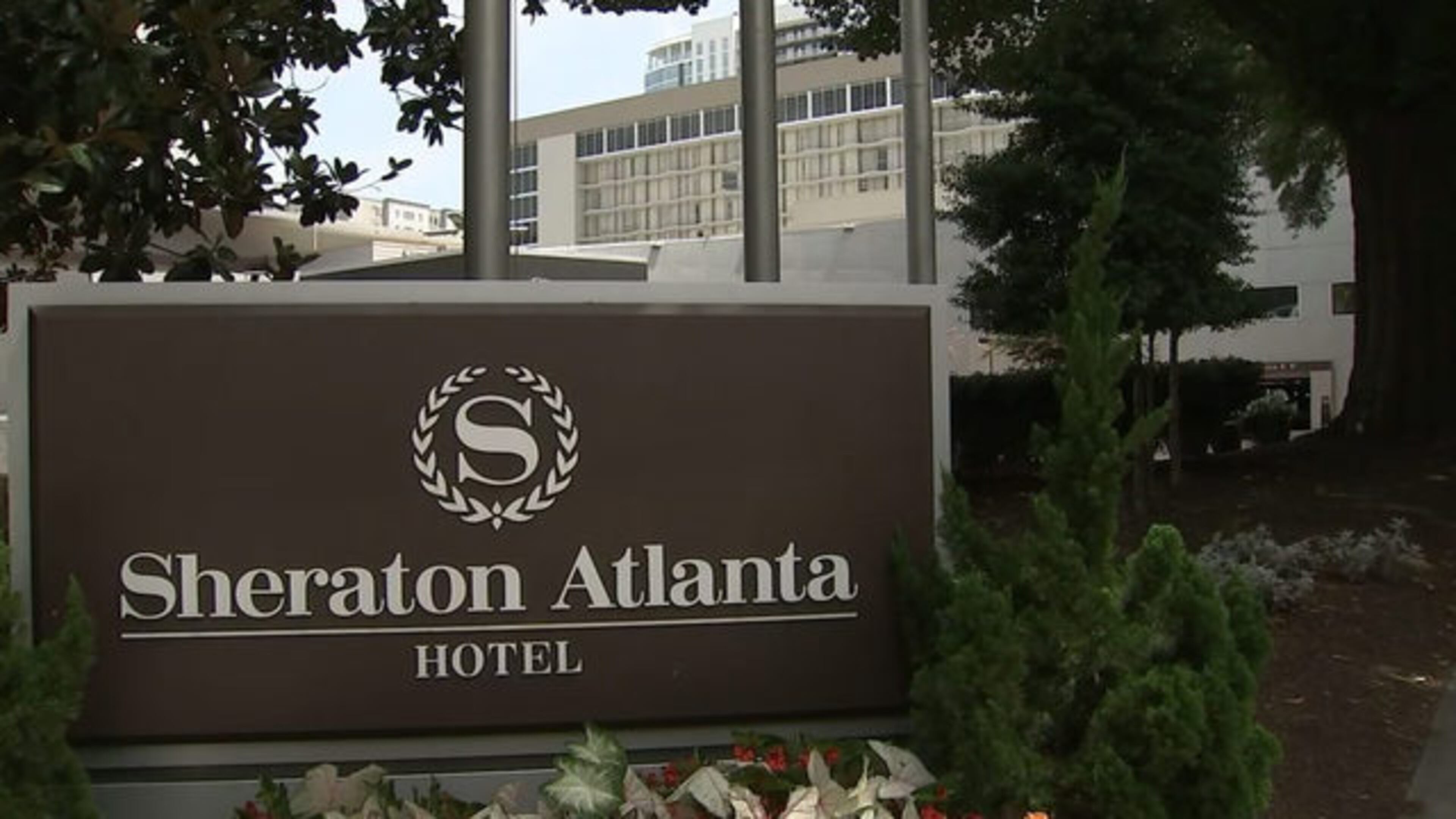Legionnaires’ outbreak shuts down Atlanta hotel and prompts probe

Investigators converged on a downtown Atlanta hotel Tuesday, testing water in pools, fountains, hot tubs and facets as they search for what caused an outbreak of the potentially deadly Legionnaires’ disease.
The Sheraton Atlanta on Courtland Street shut down Monday after three guests who recently stayed at the hotel tested positive for the disease, which causes serious lung infections. Tuesday, the Georgia Department of Public Health reported that two more guests had tested positive.
Legionnaires' disease is caused by the Legionella bacteria, which is found naturally in freshwater environments, like lakes and streams, according to the Centers for Disease Control and Prevention. But, the agency says, it can become a health concern when it grows and spreads in human-made building water systems.

Air conditioning units and mist sprayers at grocery stores also are prime breeding grounds for the bacteria. It can multiply in water fountains and ice-making machines, as well.
You can’t catch Legionnaires’ disease from person-to-person contact. Instead, most people get sick when they breathe in mist or steam and the bacterium makes its way into the lungs.
Andrea Braunstein, a representative for the Sheraton Atlanta, said the hotel will be closed at least two weeks, which is about how long testing takes, and perhaps longer. If a water source in the hotel tests positive for Legionella, remediation would take several weeks.
RELATED: What is Legionnaires' disease? FAQs about the severe form of pneumonia

The Sheraton Atlanta closed voluntarily, Georgia Department of Public Health spokeswoman Nancy Nydam said.
“The health and safety of our guests is our greatest priority,” Sheraton Atlanta general manager Ken Peduzzi said in a written statement. “We are working closely with public health officials and outside experts to conduct testing to determine if Legionella is present at the hotel. As a result, out of an abundance of caution, we have made the decision to close the hotel while we await the results.”
Nydam said Tuesday that testing for Legionella bacteria at hotels typically begins in pools, hot tubs and water fountains, the most likely culprits of the bacterium. The investigation can expand well beyond those water sources, stretching in to the hotel’s water supply system, including the plumbing system, she said.
The team of investigators will look for clues — such as whether all the sickened guests stayed on the same floor – that could help in finding the contaminated source.
Until testing is complete, health officials say they can’t be sure that the hotel is the source of the outbreak, though no other locations are being tested for Legionella.
It is believed all five people sickened with Legionnaires were attending the same conference at the Sheraton Atlanta.
Nydam said epidemiologists are reaching out to individuals who stayed at the hotel and may be experiencing symptoms of respiratory illness. Those symptoms include a cough, fever and muscle aches. Legionnaires’ disease can also be associated with other symptoms such as diarrhea, nausea, and confusion. Symptoms usually begin two to 10 days after being exposed to the bacteria, but it can take longer. People should watch for symptoms for about two weeks after exposure.
This year, there has been close to 90 confirmed cases of Legionnaires in Georgia, according to the state Department of Public Health. Last year, there were 180 confirmed cases and nine suspected cases in the state.
Nydam said guests who stayed at the hotel between June 12 and July 15 should contact their health care provider if they are suffering from respiratory illness.
Sheraton worked Monday to relocate about 450 guests to nearby hotels. Peduzzi said his staff is reaching out to guests with upcoming reservations to help them find other accommodations. Those affected also can call Marriott (the parent company of Sheraton) at 1-888-236-2427 and a reservationist can help rebook. Guests whose reservations are canceled will receive a full refund, he said.
One major event coming up is Dragon Con in late August and early September. The hotel was one of five host hotels for the event.
Meanwhile, the CDC has been made aware of the local cases of Legionnaires’ disease. State and local health departments have jurisdiction over outbreaks in their state. States can ask CDC to support an investigation when additional expertise, capacity or resources are needed. As of Tuesday evening, the agency had not been asked for assistance.
About one in 10 people who come down with Legionnaires' disease die due to complications from their illness, the CDC said. One in four who contract the disease while staying in a health-care facility will die, as their immune systems are already compromised.
The disease got its name after a 1976 outbreak at an American Legion convention in Philadelphia. Of the more than 2,000 members who attended the convention, 182 came down with the serious, atypical form of pneumonia, and 29 died.
Sheraton Atlanta and Legionnaires’ Disease
Any guests who stayed at the Sheraton Atlanta between June 12 and July 15 should speak of their health-care provider if they are experiencing symptoms of respiratory illness.
The Georgia Department of Public Health said when seeking treatment, former guests should tell their doctors that they stayed at hotel with a Legionella outbreak. This can help with proper treatment and can help with the investigation.
Public health officials are working to determine the source of Legionnaires’ disease after five guests at the Sheraton Atlanta tested positive for the rare but potentially very serious disease.
What is Legionnaires’ disease?
It’s a severe form of pneumonia — lung inflammation usually caused by infection — caused by a bacterium known as Legionella.
How does it spread?
You can’t catch Legionnaires’ disease from person-to-person contact. Instead, most people get the disease from inhaling the bacteria. Older adults, smokers and people with weakened immune systems are especially susceptible.
What are the symptoms?
Legionnaires’ usually develops two to 10 days after exposure to the bacteria and often begins with these symptoms: headache, muscle pain, chills and a fever that may be 104 degrees or higher. By the second or third day, other symptoms may include cough, shortness of breath, chest pain, gastrointestinal symptoms and confusion or other mental changes. Left untreated, it can be fatal.
How is it treated?
Prompt treatment with antibiotics usually provides the cure, but some people continue to experience problems after treatment.
SOURCE: MAYO CLINIC



